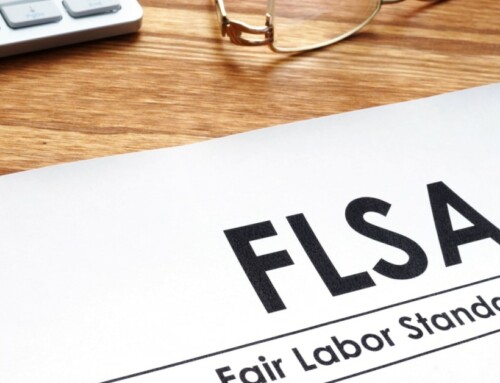On March 14, 2022, the U.S. Equal Employment Opportunity Commission (EEOC) issued updated guidance for employers regarding compliance related to the COVID-19 pandemic. The EEOC began issuing guidance in 2020, and it has made several updates over the past two years.
In its latest round of updates, the EEOC confirms that employers should continue to follow published recommendations from the U.S. Centers for Disease Control and Prevention (CDC) and local health authorities. Affirming that the ADA and other pertinent laws continue to apply during the pandemic, the EEOC notes that these laws, “do not interfere with or prevent employers from following the guidelines and suggestions made by the CDC or state/local public health authorities . . . regarding COVID-19.” The EEOC also notes that employers should continue monitoring for changes in these recommendations, and that, “employers should continue to follow the most current information on maintaining workplace safety.”
The EEOC’s guidance is presented as a series of frequently asked questions (FAQs). The FAQs that the EEOC added in March address topics ranging from telework and caregiver discrimination to reasonable accommodations for religious objections to vaccine mandates. Here are some of the highlights:
Sex Discrimination Considerations Related to Childcare at Home During the COVID-19 Pandemic
The EEOC added an FAQ regarding sex discrimination related to benefits afforded to employees with school-age children. Specifically, the FAQ addresses whether employers that provide, “telework, modified schedules, or other benefits to employees with school-age children due to school closures or distance learning,” must treat male and female employees equally.
The FAQ confirms that equal treatment is required: “Employers may provide any flexibilities as long as they are not treating employees differently based on sex . . . . For example, under Title VII, female employees cannot be given more favourable treatment than male employees because of a gender-based assumption about who may have caregiving responsibilities for children.”
In a subsequent FAQ, the EEOC provides examples of employment policies that would likely be considered discriminatory in nature. These examples include:
- Declining to assign female employees to demanding or high-profile projects that require significant overtime or travel;
- Reassigning demanding or high-profile projects to other employees based on assumptions that, “female caregivers cannot, should not, or would not want to work extra hours or be away from their families;” and,
- Denying male employees the flexibility to work from home or to work a modified schedule to enable them to perform, “pandemic-related caregiving obligations,” when offering this flexibility to similarly-situated female employees.
Discrimination Considerations Related to Care for Other Family Members with COVID-19
In addition to addressing childcare-related considerations, the EEOC’s updated guidance also addresses considerations related to care for other family members with COVID-19. In a new FAQ, the EEOC affirms that employers may not discriminate against employees who wish to provide care for their loved ones based on sex, disability, age, or any other protected characteristic. As the EEOC states, the anti-discrimination protections afforded by Title VII, the Americans with Disabilities Act (ADA), the Age Discrimination in Employment Act (ADEA), and other pertinent laws, “are available to workers with any type of caregiving responsibilities, including care for children, spouses, partners, relatives, individuals with disabilities, or others.”
With regard to leave taken to care for family members, the protections afforded by the Family and Medical Leave Act (FMLA) and other laws may apply as well.
Additional Discrimination Considerations Related to the COVID-19 Pandemic
With its March 2022 update, the EEOC added an FAQ that provides links to resources with additional information pertaining to various types of discrimination related to the COVID-19 pandemic. These include (but are not limited to):
- Employer inquiries about family members with COVID-19
- Accommodations to avoid exposing family members at high risk for complications from COVID-19
- Excluding employees from the workplace based on pregnancy
- Pregnancy-related accommodation requests pertaining to COVID-19 vaccination requirements
- Employer encouragement of vaccination for family members
- Incentives for non-employer-provided COVID-19 vaccinations and requests for related documentation
Employees’ Religious Objections to COVID-19 Vaccination Requirements
The EEOC’s March 2022 update devotes significant attention to the issue of employees’ religious objections to COVID-19 vaccination requirements. To begin, the EEOC addresses what is required in order for an employee to submit a valid religious objection:
“Employees must tell their employer if they are requesting an exception to a COVID-19 vaccination requirement because of a conflict between that requirement and their sincerely held religious beliefs, practices, or observances. . . . When making the request, employees do not need to use any ‘magic words,’ such as ‘religious accommodation’ or ‘Title VII.’ However, they need to explain the conflict and the religious basis for it.
“The same principles apply if employees have a religious conflict with getting a particular vaccine and wish to wait until an alternative version or specific brand of COVID-19 vaccine is available to them.”
The EEOC encourages employers to implement employment policies that provide employees with information about how to request religious accommodations related to COVID-19 vaccination requirements as a “best practice.”
When evaluating employees’ requests for religious accommodations, employers must, “proceed on the assumption that a request for religious accommodation is based on sincerely held religious beliefs . . . .” However, employers are entitled to make a “limited factual inquiry” if they have an objective basis for doubting the authenticity of an employee’s request. If an employer makes a valid inquiry and the employee fails to respond appropriately, the employee, “risks losing any subsequent claim that the employer improperly denied an accommodation.”
In its updated FAQs, the EEOC affirms that employers do not need to provide an employee’s preferred reasonable accommodation if other options are available. “ The employer should consider the employee’s preference but is not obligated to provide the reasonable accommodation preferred by the employee.” Finally, the EEOC also affirms that an employer does not have to treat all requests for religious accommodations equally—acknowledging that the following are all relevant factors:
- The type of workplace;
- The nature of employees’ duties;
- The location at which employees perform their duties;
- The number of employees who are fully vaccinated;
- The number of employees and others who enter the workplace; and,
- The number of employees who require a particular accommodation.
Speak with a South Carolina Employment Lawyer about Your Company’s Needs
If you have questions about your company’s legal obligations related to the ongoing COVID-19 pandemic, we encourage you to reach out to us at Gignilliat, Savitz & Bettis LLP. Please call 803-799-9311 or inquire online today.






